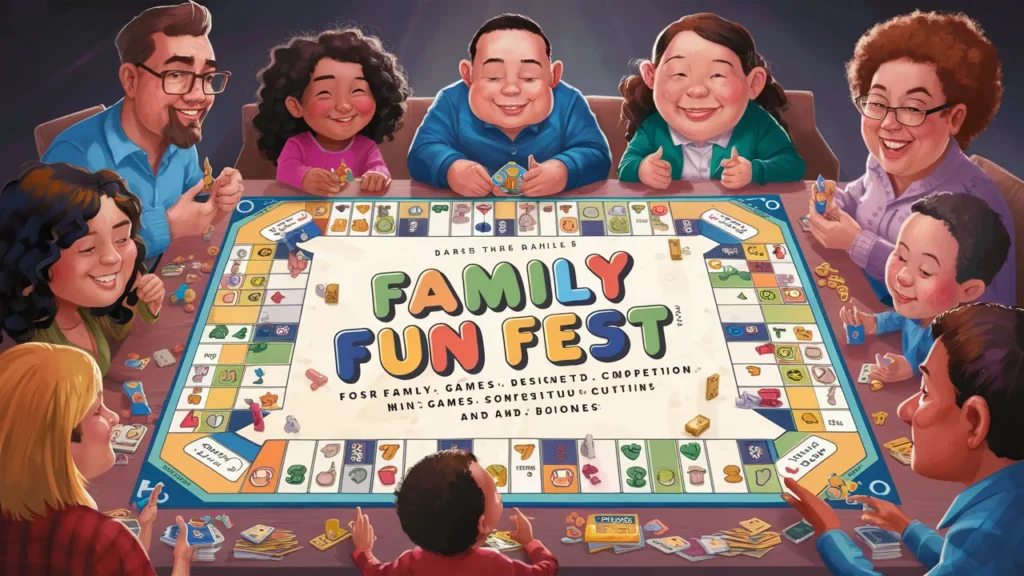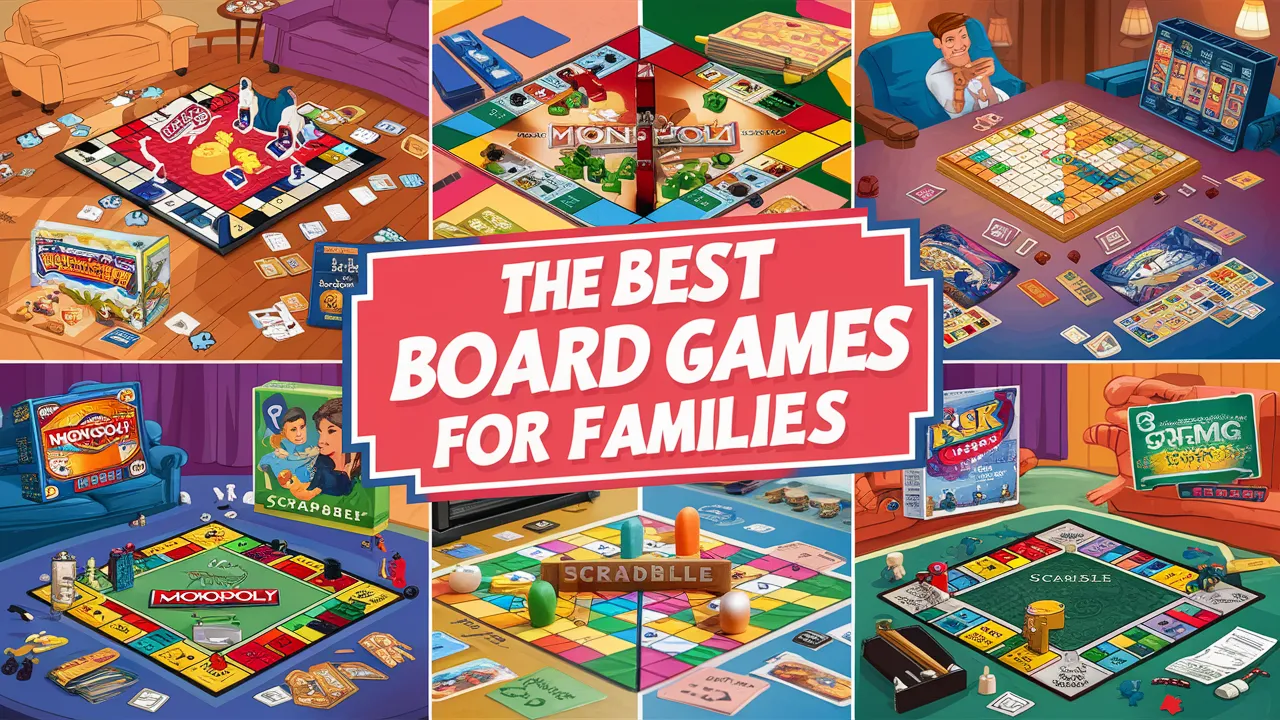Introduction
Gathering around a board game can transform an ordinary evening into an extraordinary bonding experience for families. Board games provide a unique opportunity for engagement, laughter, and learning. In this article, we will explore the significance of family game nights, criteria for selecting the best games, and highlight some of the top choices across various age groups.
Understanding the Importance of Family Game Nights
Family game nights are more than just entertainment; they serve as an essential platform for developing relationships within the family unit. Engaging in these activities fosters communication, teamwork, and good sportsmanship.
Moreover, game nights allow families to unplug from technology and enjoy each other’s company. This can lead to meaningful conversations and shared experiences that strengthen the family bond. The simple act of gathering around a table, laughing, and sharing stories can create an atmosphere of warmth and connection that is often missing in our fast-paced lives.
Strengthening Bonds through Board Games
Participating in board games encourages interaction that might not occur in daily life. Through competition or collaboration, family members can learn more about each other’s personalities, problem-solving styles, and communication methods.
As players cheer for victories or console each other during losses, they reinforce trust and understanding. This emotional support can deepen family ties and create lasting memories. Additionally, the playful banter and lighthearted teasing that often accompany game nights can help to diffuse tension and foster a sense of belonging, making everyone feel valued and appreciated within the family structure.
The Educational Value of Board Games
Board games can also be incredibly beneficial in an educational context. Many games incorporate critical thinking, strategy, and decision-making skills that can engage both children and adults alike.
For example, games with abstract rules can enhance logical reasoning, while those that involve storytelling can spur creativity. Families can turn game nights into learning opportunities while still having fun. Furthermore, many modern board games are designed with educational themes, covering topics such as history, science, and mathematics, allowing families to explore new subjects together in an enjoyable and interactive way. This blend of education and entertainment not only enriches the family experience but also instills a lifelong love of learning in children.
Criteria for Choosing the Best Family Board Games
When considering board games for family nights, it’s essential to evaluate several factors to ensure everyone will enjoy the experience. Each game should be tailored to the unique dynamics of your family.
Age Appropriateness and Complexity
One of the first considerations should be the age range of the players involved. Selecting a game that suits the youngest participant will often cater to the entire family. Look for games with varying levels of complexity to accommodate both younger children and adults.
Many board games feature age recommendations, offering insight into whether the content and gameplay align with your family’s capabilities and interests.
Game Duration and Replayability
Another important aspect is the game’s duration. Families may prefer shorter games during weekdays while enjoying longer ones on weekends. Opt for games that can fit different time constraints and also offer high replayability to keep interest alive.
Replayability is key; you want a game that can be played multiple times without feeling repetitive or stale. Games that evolve based on player strategies can frequently challenge family members and induce curiosity.
Theme and Artwork Considerations
The visual appeal of a game can enhance the overall experience. Games with vibrant artwork and engaging themes can captivate players immediately, drawing them into the gameplay. Look for games that resonate with your family’s interests, whether they favor fantasy worlds, historical narratives, or cooperative adventures.
Attractive components can heighten the excitement and encourage participation, making game nights more enjoyable for everyone involved.

Top Board Games for Younger Children
When it comes to selecting board games for younger family members, focusing on creativity and skill development can make a significant impact. Below are some ideal choices for this age group.
Games that Encourage Creativity
- Dixit: A game rich in imagination where players interpret beautiful, surreal illustrations to create narratives.
- Draw It: A drawing game that encourages artistic expression and storytelling through illustrations.
These games not only entertain but also foster creativity and encourage kids to think outside the box.
Games that Teach Basic Skills
- Count Your Chickens: A cooperative game where young players practice counting and teamwork.
- Candy Land: A classic race-to-the-finish game that introduces basic color recognition and turn-taking.
These games provide foundational skills in a playful and engaging manner.
Best Board Games for Teens and Adults
As families grow, so do their gaming preferences. Here are some excellent options for teens and adults that cater to strategic thinking and social interaction.
Strategy Games for Older Players
- Catan: A game centered around resource management and negotiation, perfect for strategic thinkers.
- Ticket to Ride: A route-building game that combines adventure and planning.
These games challenge players to think critically, making them ideal for older age groups who thrive on competition and strategy.
Party Games for Large Family Gatherings
- Wits & Wagers: A trivia game combined with gambling, ideal for family gatherings where more players are involved.
- Taboo: A fast-paced game that requires communication and quick thinking, drawing laughter and engagement across all ages.
These party games ensure that everyone can join in, fostering large-scale fun and connection.
Classic Board Games with a Twist
Classic games often have a charm that transcends generations. However, modern adaptations offer exciting new spins on beloved themes.
Modern Takes on Traditional Games
- Pandemic: A cooperative game where players work together to stop global outbreaks, turning traditional competitive gameplay into teamwork.
- Millennium Blades: A collectible card game that plays within the context of a fictional trading card game competition.
These modern versions maintain the essence of classic games while introducing innovative mechanics that can intrigue new generations of players.
Revamped Classics for a New Generation
- Clue: Secrets & Spies: A contemporary rendition of the classic mystery board game with added complexity and intrigue.
- Monopoly: Socialism: A twist on the traditional economic strategy game that encourages cooperation among players.
These revamped classics invite families to explore familiar gameplay with fresh perspectives, ensuring engagement for both new and seasoned players.
Conclusion
Board games can be a cornerstone of family interaction, education, and fun. By choosing the right games, families can create unforgettable memories, nurture relationships, and enjoy learning together. Whether it’s a creative game for the younger ones or a strategic challenge for teens and adults, there’s something for everyone, making game nights a family tradition worth continuing.

Leave a Reply